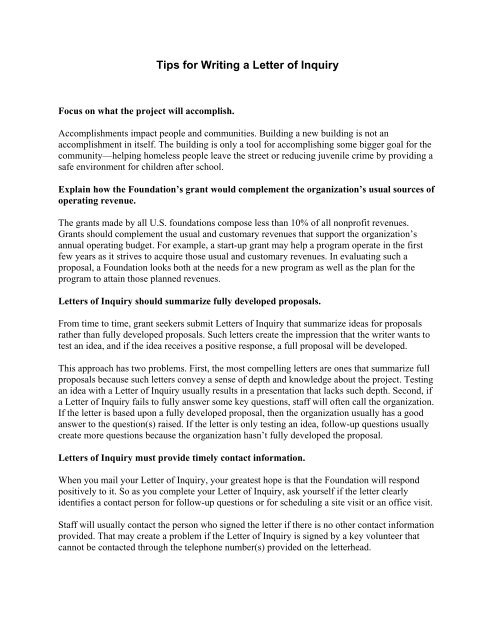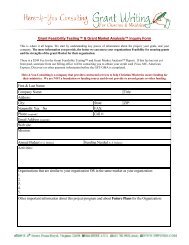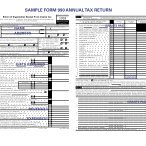Tips for Writing a Letter of Inquiry
Tips for Writing a Letter of Inquiry
Tips for Writing a Letter of Inquiry
You also want an ePaper? Increase the reach of your titles
YUMPU automatically turns print PDFs into web optimized ePapers that Google loves.
<strong>Tips</strong> <strong>for</strong> <strong>Writing</strong> a <strong>Letter</strong> <strong>of</strong> <strong>Inquiry</strong><br />
Focus on what the project will accomplish.<br />
Accomplishments impact people and communities. Building a new building is not an<br />
accomplishment in itself. The building is only a tool <strong>for</strong> accomplishing some bigger goal <strong>for</strong> the<br />
community—helping homeless people leave the street or reducing juvenile crime by providing a<br />
safe environment <strong>for</strong> children after school.<br />
Explain how the Foundation’s grant would complement the organization’s usual sources <strong>of</strong><br />
operating revenue.<br />
The grants made by all U.S. foundations compose less than 10% <strong>of</strong> all nonpr<strong>of</strong>it revenues.<br />
Grants should complement the usual and customary revenues that support the organization’s<br />
annual operating budget. For example, a start-up grant may help a program operate in the first<br />
few years as it strives to acquire those usual and customary revenues. In evaluating such a<br />
proposal, a Foundation looks both at the needs <strong>for</strong> a new program as well as the plan <strong>for</strong> the<br />
program to attain those planned revenues.<br />
<strong>Letter</strong>s <strong>of</strong> <strong>Inquiry</strong> should summarize fully developed proposals.<br />
From time to time, grant seekers submit <strong>Letter</strong>s <strong>of</strong> <strong>Inquiry</strong> that summarize ideas <strong>for</strong> proposals<br />
rather than fully developed proposals. Such letters create the impression that the writer wants to<br />
test an idea, and if the idea receives a positive response, a full proposal will be developed.<br />
This approach has two problems. First, the most compelling letters are ones that summarize full<br />
proposals because such letters convey a sense <strong>of</strong> depth and knowledge about the project. Testing<br />
an idea with a <strong>Letter</strong> <strong>of</strong> <strong>Inquiry</strong> usually results in a presentation that lacks such depth. Second, if<br />
a <strong>Letter</strong> <strong>of</strong> <strong>Inquiry</strong> fails to fully answer some key questions, staff will <strong>of</strong>ten call the organization.<br />
If the letter is based upon a fully developed proposal, then the organization usually has a good<br />
answer to the question(s) raised. If the letter is only testing an idea, follow-up questions usually<br />
create more questions because the organization hasn’t fully developed the proposal.<br />
<strong>Letter</strong>s <strong>of</strong> <strong>Inquiry</strong> must provide timely contact in<strong>for</strong>mation.<br />
When you mail your <strong>Letter</strong> <strong>of</strong> <strong>Inquiry</strong>, your greatest hope is that the Foundation will respond<br />
positively to it. So as you complete your <strong>Letter</strong> <strong>of</strong> <strong>Inquiry</strong>, ask yourself if the letter clearly<br />
identifies a contact person <strong>for</strong> follow-up questions or <strong>for</strong> scheduling a site visit or an <strong>of</strong>fice visit.<br />
Staff will usually contact the person who signed the letter if there is no other contact in<strong>for</strong>mation<br />
provided. That may create a problem if the <strong>Letter</strong> <strong>of</strong> <strong>Inquiry</strong> is signed by a key volunteer that<br />
cannot be contacted through the telephone number(s) provided on the letterhead.
Preferably the last paragraph <strong>of</strong> the <strong>Letter</strong> <strong>of</strong> <strong>Inquiry</strong> should provide the contact in<strong>for</strong>mation. In a<br />
small, volunteer-run organization this might be a board member. Organizations with staff should<br />
provide contact in<strong>for</strong>mation <strong>for</strong> the executive director and/or the development director.<br />
Submit your <strong>Letter</strong> <strong>of</strong> <strong>Inquiry</strong> as soon as possible, but not be<strong>for</strong>e the project is ready.<br />
Grant requests may be turned down or deferred if it appears that it is too early in the project <strong>for</strong><br />
the Foundation to pursue a grant. Grant seekers can improve their chances if they follow three<br />
guidelines:<br />
1. Capital campaigns should achieve a substantial percentage <strong>of</strong> goal (<strong>of</strong>ten 40% to 50%)<br />
be<strong>for</strong>e writing to a Foundation. The Foundation wants to know that the project has local<br />
support.<br />
2. If the project hinges upon a key commitment, be reasonably sure that commitment is in<br />
place be<strong>for</strong>e writing a <strong>Letter</strong> <strong>of</strong> <strong>Inquiry</strong>. Such commitments might be a large grant from a<br />
major foundation or a major government grant.<br />
3. Fully develop the vision <strong>for</strong> what the project will accomplish. Building a building is not<br />
an accomplishment itself. The building is only a tool <strong>for</strong> accomplishing a larger<br />
community good.<br />
Be prepared <strong>for</strong> your reporting responsibilities.<br />
The first step to your next grant is your reporting on your current grant. When you receive a<br />
grant, make sure that you plan <strong>for</strong> update reports to all donors. The narrative should outline both<br />
the progress toward the program objectives outlined in your <strong>for</strong>mal application and an update on<br />
the budget submitted with the <strong>for</strong>mal application. Reports should be made at least every six<br />
months until the project is completed.<br />
Remember that your budget is only a plan.<br />
While budgets are important, they are only tools <strong>for</strong> understanding bigger issues. Your <strong>Letter</strong> <strong>of</strong><br />
<strong>Inquiry</strong> should outline the problem/opportunity your organization wants to deal with and how it<br />
plans to approach the situation. Naturally, that raises the question, “What resources do you need<br />
<strong>for</strong> this project?” A budget is a tool <strong>for</strong> answering that question.<br />
In addition, no budget is complete without an income portion. This portion <strong>of</strong> the budget<br />
explains how you plan to garner the resources you need <strong>for</strong> the project. Often this is the most<br />
difficult portion <strong>of</strong> the budget.<br />
<strong>Letter</strong>s <strong>of</strong> <strong>Inquiry</strong> only need to summarize the budget in<strong>for</strong>mation with figures such as total<br />
project cost, the plan <strong>for</strong> raising needed resources, and a request <strong>for</strong> a specific amount from the<br />
Foundation.






